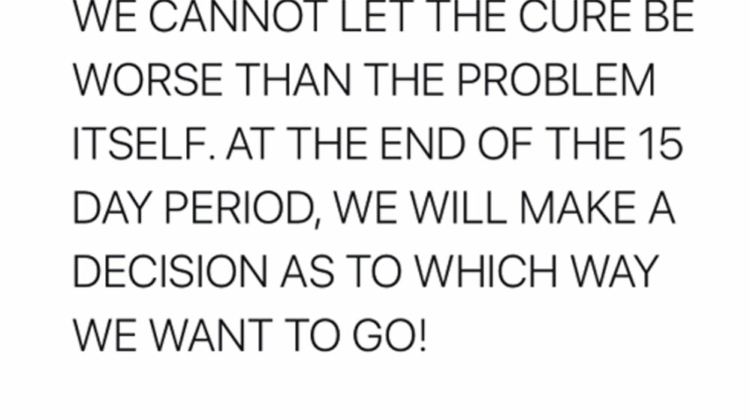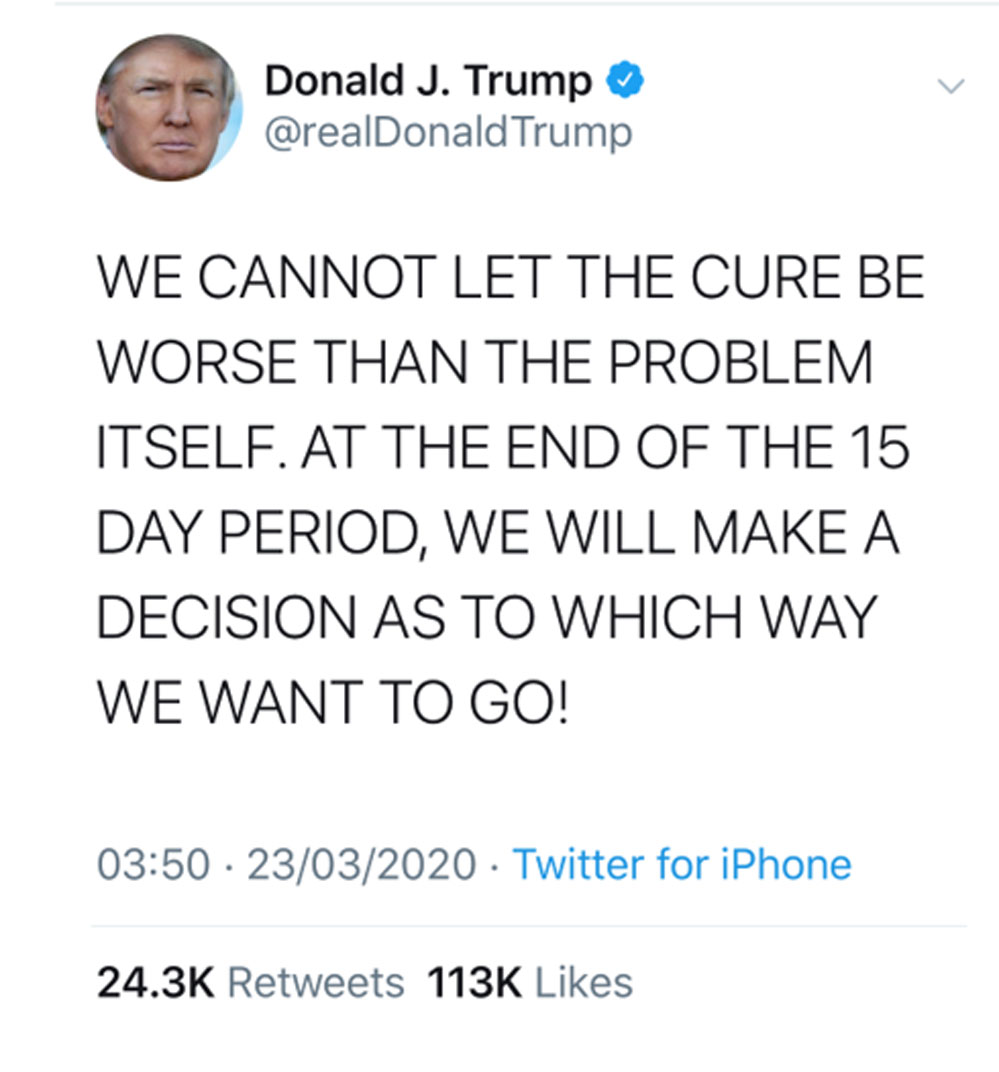
“Keep away from me please.”
I have never been asked that before, especially not by a young woman cowering away from me.
I stuck my hands up and backed off, suddenly seeing how small she looked, all at once aware of my size and my noise and my slightly dodgy leggings and crumpled sweater. I desperately wanted her to understand I would never hurt her, that I would never harm anyone.
There in the security line at New York’s JFK airport things were tense – understandably so, given the city had started to lock down and flights were being grounded around us. The tiny lady ahead of me who asked me to step away was wearing her mask, gloves and a scarf pulled up high around her nose. Young and pretty, French perhaps, she had understood the new rules for saving yourself and was desperately trying to follow them, to keep social distance in an airport line, to not catch this killer that no-one can see.
I felt bad for getting so close to her. I felt horrible at being perceived as a threat. And I felt even worse that people have become so terrified that they literally shake with fear just trying to stand in line and get home.
Now being shouted at by the guard herding her through security clearance like an animal at an abattoir – “Shoes off, coats off, electricals out!” – she tried to explain she didn’t want to be too close to anyone.
“I haven’t got time for your sh*t today. Get in line or get out,” was his response.
These are the moments. The flare-ups. The wrestle in the supermarket aisle over toilet roll, the fight in line when someone steps out of turn, the incriminating glances at those not wearing gloves or masks, the spitting at a Chinese man on the subway, the search for someone to blame.
It is natural, I think. When the enemy is invisible, we choose something physical to take out our anxieties on, or defend ourselves with, whether that be toilet paper, the celebrity who said the wrong thing about coronavirus – #VanessaHudgens – or the young lad still partying in Miami for Spring Break. We channel our negative emotion onto these people.
The strength of fear right now also exacerbates the hatred. As I have continued to walk the deserted streets of Manhattan I have grown increasingly worried for our Chinese friends, concerned that one man’s rage over the loss of his job will distort his view of who is to blame and explode into a physical attack. I try to wave at Chinese mums and their children. I ate my last meal before the lockdown at a Chinese restaurant on 79th. Clearly these ordinary people do not represent the Chinese Communist Party or the cruel regime.
Of course, the mainstream media bears responsibility for a great deal of the excess negative emotion washing about. Without apology, they have been exploiting our sudden sense of our own mortality for clicks and views, providing an endless churn of body bags and victims gasping for air.
Italy’s death rate is one example. The British Broadcasting Corporation (BBC) reported that it stands at 5,000, “surpassing that of China”. But the supporting facts aren’t being reported.
Back in 2013 the BBC reported on the transformation of northern Italy by Chinese garment workers who were forcing down prices, importing cheap fabrics from China, and outnumbering the Italian locals: “There are now more Chinese garment manufacturers than there are Italian textile producers.”
In 2020 these same Chinese workers in Italy traveled back to China to celebrate the Lunar New Year, many of them to the epicentre of the pandemic: Wuhan, On their return to Italy, they brought the virus with them, giving it a stronghold in the center of Europe.
Northern Italy has an aging native population, many of whom have underlying health conditions, making them the most susceptible to this virus. The consequence is the unusually high death rate in Italy.
Laid out like this, with some background facts and rational thinking, it is possible to extrapolate that, while the situation is truly horrific, it is also the result of a perfect storm of exceptional factors.
Sadly, the mainstream media doesn’t think you are able to handle this level of complexity or detail. Or rather, they simply cannot be bothered to tell it.
Instead they have gone straight for the fear factor, focusing on the Italian obituaries which used to take up half a page and are now eleven pages long. On the news, we are shown endless footage of the coffins of Italians being driven in military convoy for a mass cremation.
This is reporting of a sort. But it is reporting focused on death and fear, not fact and information.
And it is yet another reminder of how far we have come from the days when news services actually reported news and gave a voice to information providers on either side of the political aisle.
Democrat leaders in New York and California have seemingly been in competition to see who could shut down the most the fastest.
Traveling around NYC during the closure of first Broadway, then restaurants and bars, and finally flights, my conversations with New Yorkers have not been about death, but about the reality of regular lives lived pay-check to pay-check. The work has stopped but the bills have not.
One Uber driver is down to a handful of rides a day and a trip to the airport now means a return journey with an empty car. His wife was laid off two days earlier. She worked as a waitress for eight years at the same restaurant on 53rd. Her employers told her by email on Sunday night that she should not come in on Monday.
Another lady, in Pittsburgh, worked a perfume counter at a major retailer. Her bosses called her as she was standing serving customers and told her to go upstairs to the staff room, to get her stuff and to go home, and that she would not be paid for that day. The immediacy of the cull was a gut punch felt across the city and far crueler than any virus.
A self-employed hairdresser explains how she worries for her elderly clients. She cannot continue to work, but for many of them she is the only company they have in their day.
As upper East-siders discussed share prices noisily on phones outside WholeFoods, downtown and mid-town the heart of the city that only earns enough to over the bills each month was beating fast.
In a topsy-turvy world we retreat to our family for strength, but with COVID-19 we are told that we have to push them away, separate, self-isolate, for fear of becoming the killers of those we love the most. March 22 was Mothering Sunday in the UK. Many spent it smiling lovingly at their treasured mums through panes of glass.
This phase will pass. The shock to our systems will continue to travel in waves through us and back again, but much diminished, like a nuclear bomb as the blast sweeps back through.
There is a new phase ahead. Fatigue over news of fear and panic is already setting in, and there is a desire for optimism and positivity instead. I see it already with my followers on line and friends in person. We are looking for ways to cope. We need to be lifted up and are hungry for good news.
In the UK, the British Chancellor announced a $400 billion rescue package for business and emergency grants of $30,000 for pubs and restaurants forced to close. He reiterated that the country will ‘do whatever it takes’ to get through this.
Known facts, recovery rates, reduced infection rates, increased production of protective equipment, manufacturers switching to ventilator production — all of these data points will become part of our mechanism for coping and recovering from this virus, and for moving more quickly to rebuild our economy after this shock.
Trump has tweeted to similar effect:
 Trump says we cannot let the cure be worse than the problem. In the absence of a solution, shutting down everything makes sense. The affluent can afford to stop. But working Americans cannot afford an indefinite shutdown. Poverty and despair are bigger killers than the flu.
Trump says we cannot let the cure be worse than the problem. In the absence of a solution, shutting down everything makes sense. The affluent can afford to stop. But working Americans cannot afford an indefinite shutdown. Poverty and despair are bigger killers than the flu.
Now we are identifying cases, finding fixes, working the problem, trialing vaccines — we might look to a time we will be open for business once again.
Once we are able to identify those with the virus (carriers and sufferers) and isolate the vulnerable and elderly, perhaps it will be possible to allow the rest of us to get back to work. Less total shutdown, more total protection.
In the interim, Trump will be fighting hard for Americans. In turn we have to fight to protect each other, following the instructions on social distancing, and stepping away from the media using our anxiety to spoon-feed us pure fear.


Leave a Reply